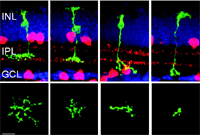Novartis Research announces breakthrough in restoring light sensitivity in damaged retinas
29 April 2008
 The Friedrich Miescher Institute of the Novartis Research Foundation (FMI) today announced a novel technique that restores light sensitivity to previously unresponsive retinas in blind mice and, remarkably, produces light-induced behavioral change in mice with retinal damage.
The Friedrich Miescher Institute of the Novartis Research Foundation (FMI) today announced a novel technique that restores light sensitivity to previously unresponsive retinas in blind mice and, remarkably, produces light-induced behavioral change in mice with retinal damage.
The approach pioneered at FMI could be an alternative to surgical transplantation of electrode arrays for the millions affected by blindness as a result of retinitis pigmentosa and late-stage macular degeneration.
Funding for the study was provided by the Novartis Research Foundation and grants from the Marie Curie Excellence programme, the US Office of Naval Research NICOP Grant, and Human Frontiers Science Programme.
A study on the technique, published in Nature Neuroscience, indicates that the approach could be an alternative to surgical transplantation of electrode arrays.
"We are excited and encouraged by the results of the study, which open the way for clinical trials in humans," said Susan M. Gasser, Director of FMI. "The new technique developed at the FMI could revolutionize the way that retinitis pigmentosa and late-stage macular degeneration are treated, potentially eliminating the need for surgery."
The research team headed by Botond Roska of FMI, in collaboration with Connie Cepko of Harvard Medical School, adopted a novel approach by administering a gene of a light-activated protein from green algae to selected retinal cells (ON Bipolar cells). Their innovation involves the selective restoration of light sensitivity to circuits that respond to increases in light level (ON circuits) and not those that respond to decreasing light levels (OFF circuits). Treatment of blind mice with this technique enabled them to successfully perform visually guided behavioral tasks, an unprecedented result.
